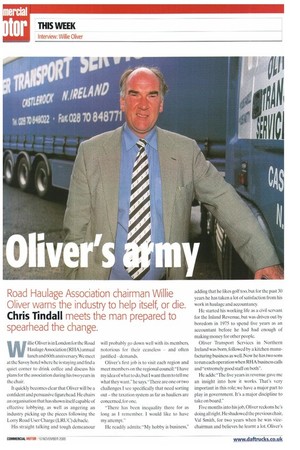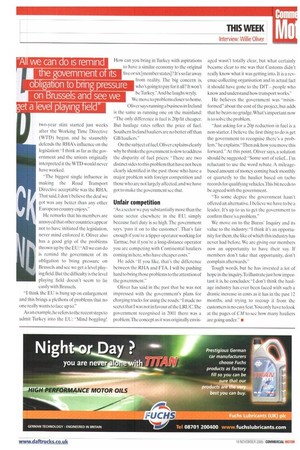Road Haulage Association chairman Willie Oliver warns the industry to help itself, or die.
Page 24

Page 25

If you've noticed an error in this article please click here to report it so we can fix it.
Chris Tindall meets the man prepared to spearhead the change.
Willie Oliver is in London for the Road Haulage Association (RHA)annual lunch and 60th anniversary. We meet at the Savoy hotel where he is staying and find a quiet corner to drink coffee and discuss his plans for the association during his two years in the chair.
It quickly becomes clear that Oliver will be a confident and persuasive figurehead. He chairs an organisation that has shown itself capable of effective lobbying, as well as angering an industry picking up the pieces following the Lorry Road User Charge (LRUC) debacle.
His straight talking and tough demeanour will probably go down well with its members, notorious for their ceaseless and often justified demands.
Oliver's first job is to visit each region and meet members on the regional council: "I have my idea of what to do,but I want them to tell me what they want,he says. "There are one or two challenges I see specifically that need sorting out the taxation system as far as hauliers are concerned, for one.
"There has been inequality there for as long as I remember. I would like to have my attempt."
He readily admits: "My hobby is business," adding that he likes golf too, but for the past 30 years he has taken a lot of satisfaction from his work in haulage and accountancy.
He started his working life as a civil servant for the Inland Revenue, but was driven out by boredom in 1975 to spend five years as an accountant before he had had enough of making money for other people.
Oliver Transport Services in Northern Ireland was born, followed by a kitchen manufacturing business as well. Now he has two sons to run each operation when RHA business calls and "extremely good staff on both".
He adds: "The five years in revenue gave me an insight into how it works. That's very important in this role; we have a major part to play in government. It's a major discipline to take on board."
Five months into his job, Oliver reckons he's doing all right. He shadowed the previous chair, Val Smith, for two years when he was vicechairman and believes he learnt a lot. Oliver's two-year stint started just weeks after the Working Time Directive (WTD) began, and he staunchly defends the RH A's influence on the legislation: think as far as the government and the unions originally interpreted it the WTD would never have worked.
"The biggest single influence in making the Road Transport Directive acceptable was the RHA. That said, I don't believe the deal we got was any better than any other European country enjoys" He remarks that his members are annoyed that other countries appear not to have initiated the legislation, never mind enforced it. Oliver also has a good grip of the problems thrown up by the EU:-All we can do is remind the government of its obligation to bring pressure on Brussels and see we get a level playing field. But the difficulty is the level playing field doesn't seem to lie easily with Brussels.
"1 think the EU is hung up on enlargement and this brings a plethora of problems that no one really wants to face up to."
As an example,he refers to the recent steps to admit Turkey into the ELI: "Mind boggling! How can you bring in Turkey with aspirations to have a similar economy to the original five or six [member states]? It's so far away from reality. The big concern is, who's going to pay for it all? It won't be Turkey" And he laughs wryly.
We move to problems closer to home. Oliver says running a business in Ireland is the same as running one on the mainland: "The only difference is fuel is 20p/lit cheaper. But haulage rates reflect the price of fuel. Southern Ireland hauliers are no better off than GB hauliers."
On the subject of fuel, Oliver explains clearly why he thinks the government is slow to address the disparity of fuel prices: "There are two distinct sides to this problem that have not been clearly identified in the past: those who have a major problem with foreign competition and those who are not largely affected,and we have got to make the government see that.
Unfair competition "As a sector we pay substantially more than the same sector elsewhere in the EU, simply because fuel duty is so high. The government says, 'pass it on to the customer'. That's fair enough if you're a tipper operator working for Tarmac, but if you're a long-distance operator you are competing with Continental hauliers coming in here, who have cheaper costs" He adds -If you like, that's the difference between the RHA and FTA. I will be pushing hard to bring those problems to the attention of the government."
Oliver has said in the past that he was not impressed with the government's plans for charging trucks for using the roads: "I made no secret that I was not in favour of the LRUC.The government recognised in 2001 there was a problem.The concept as it was originally envis aged wasn't totally clear, but what certainly became clear to me was that Customs didn't really know what it was getting into. It is a revenue-collecting organisation and in actual fact it should have gone to the DfT — people who know and understand how transport works.
He believes the government was "misinformed" about the cost of the project, but adds that he bears no grudge. What's important now is to solve the problem.
"Just asking for a 20p reduction in fuel is a non-starter. I believe the first thing to do is get the government to recognise there's a problem," he explains. "Then ask how you move this forward." At this point, Oliver says, a solution should be suggested: "Some sort of relief... I'm reluctant to use the word rebate. A mileagebased amount of money coming back monthly or quarterly to the haulier based on tacho records for qualifying vehicles.This bit needs to be agreed with the government.
"To some degree the government hasn't offered an alternative. I believe we have to be a leader. It's up to us to get the government to confirm there's a problem."
We move on to the Burns' Inquiry and its value to the industry:"! think it's an opportunity for them, the like of which this industry has never had before. We are giving our members now an opportunity to have their say. If members don't take that opportunity, don't complain afterwards."
Tough words, but he has invested a lot of hope in the inquiry.To illustrate just how important it is, he concludes: -1 don't think the haulage industry has ever been faced with such a drastic increase in costs as it has in the past 12 months, and trying to recoup it from the customers is no easy feat.You only have to look at the pages of CM to see how many hauliers are going under." •






































































































































































































